 Petzlover
Petzlover Hungarian Wirehaired Vizsla is originated from Hungary but Utonagan is originated from United Kingdom. Hungarian Wirehaired Vizsla may grow 20 cm / 7 inches shorter than Utonagan. Hungarian Wirehaired Vizsla may weigh 10 kg / 23 pounds more than Utonagan. Both Hungarian Wirehaired Vizsla and Utonagan has same life span. Both Hungarian Wirehaired Vizsla and Utonagan has almost same litter size. Hungarian Wirehaired Vizsla requires Low Maintenance. But Utonagan requires Moderate Maintenance
Hungarian Wirehaired Vizsla is originated from Hungary but Utonagan is originated from United Kingdom. Hungarian Wirehaired Vizsla may grow 20 cm / 7 inches shorter than Utonagan. Hungarian Wirehaired Vizsla may weigh 10 kg / 23 pounds more than Utonagan. Both Hungarian Wirehaired Vizsla and Utonagan has same life span. Both Hungarian Wirehaired Vizsla and Utonagan has almost same litter size. Hungarian Wirehaired Vizsla requires Low Maintenance. But Utonagan requires Moderate Maintenance
 In the 1930’s some breeders noticed that the Hungarian Vizsla produced some dogs with more water, cold weather and ground cover protection because they had a much thicker coat than most of the breed. One breeder decided to cross one of these females with a German Wirehaired Pointer, thus producing the first Hungarian Wirehaired Vizsla. There were now three types of Vizsla – the smooth coated, the longhaired, and the wirehaired. The longhaired is very rare and can be either smooth or wirehaired. It is also believed based on anecdotal evidence that the original Wirehaired Vizsla was also mixed with the Bloodhound, Pudelpointer, and Irish Setter during World War II. Many kennels started breeding the Wirehaired Vizsla at this time.
In the 1930’s some breeders noticed that the Hungarian Vizsla produced some dogs with more water, cold weather and ground cover protection because they had a much thicker coat than most of the breed. One breeder decided to cross one of these females with a German Wirehaired Pointer, thus producing the first Hungarian Wirehaired Vizsla. There were now three types of Vizsla – the smooth coated, the longhaired, and the wirehaired. The longhaired is very rare and can be either smooth or wirehaired. It is also believed based on anecdotal evidence that the original Wirehaired Vizsla was also mixed with the Bloodhound, Pudelpointer, and Irish Setter during World War II. Many kennels started breeding the Wirehaired Vizsla at this time.
This rare longhaired is not recognized by any official club or organization while the smooth and the wired are recognized as two separate breeds. There are only a few longhaired Vizsla and they are only found in Europe. The Wirehaired Vizsla was recognized in 1986 by the FCI in Europe and in 2014 by the AKC (American Kennel Club).
Like their cousins the smooth Hungarian Vizsla, the wirehaired version is a natural hunter and easily trained. They are great retrievers as well as pointers in the water or on the land. Their wirehair coats offer them more protection than their smooth coated cousins. They love to swim and are very good at it and will even use your back yard pool if it is available to them.
The wirehaired Vizsla came to North America in the 1970’s and was recognized by the CKC (Canadian Kennel Club) in 1977, The North American Versatile Hunting Dog Association (NAVHDA) by 1986 and in 2006 by the United Kennel Club (UKC). The Australian Nation Kennel Council offered recognition in 2007 prior to their entrance into the AKC Foundation Stock Service. They began showing the breed at AKC events in Performance and Companionship, prior to their full AKC recognition in 2014.
These gentle hunting dogs became great family dogs as they love children and just want to be with their people. Falconers have recently taken up the breed because their temperament is suited to this work as well. There are only about 400 to 450 Wirehaired Vizslas left in the United States and few thousand across the globe.
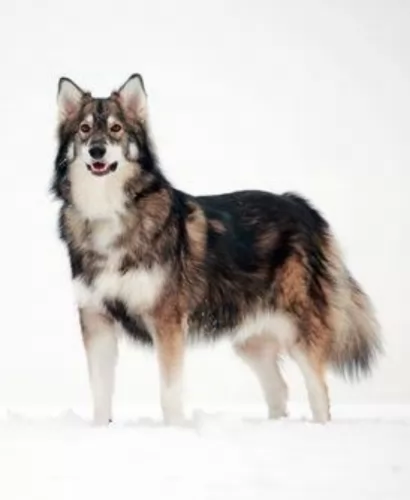 The Utonogan is such a wolf-like dog, you couldn’t be blamed for thinking you’d come face to face with a true wolf. They’re a rare dog breed that came about from crossing the Siberian Husky, the German Shepherd and the Alaskan Malamute.
The Utonogan is such a wolf-like dog, you couldn’t be blamed for thinking you’d come face to face with a true wolf. They’re a rare dog breed that came about from crossing the Siberian Husky, the German Shepherd and the Alaskan Malamute.
The dog was developed by Edwina Harrison and it was in the 1980s that the dog was introduced into the UK.
The Utonagan is a rare dog with only a few breeders. Take care with where you buy your Utonogan from and certainly steer clear of backyard breeders or puppy mills.
 Very much like his cousins, the Wirehaired Vizsla is a noble looking breed. He is lean and muscular with a noble head and moderate skull line. Their muzzle is just a little shorter than the skull and the end is squared. They have powerful jaws and a broad, wide nostrils. The nose is brown, and the eyes are slightly darker than the dog’s coat color.
Very much like his cousins, the Wirehaired Vizsla is a noble looking breed. He is lean and muscular with a noble head and moderate skull line. Their muzzle is just a little shorter than the skull and the end is squared. They have powerful jaws and a broad, wide nostrils. The nose is brown, and the eyes are slightly darker than the dog’s coat color.
Low set ears are long and hang near the cheeks. With a strong, long neck and muscular shoulders, the Wirehaired Vizsla certainly looks the part of a hunting dog. Her chest is a little deep and the breastbone is prominent. She has round paws with short nails. Of course, her coat is wiry and dense. The undercoat is water repellent. He has an intelligent and lively facial expression.
Their ears are long but proportionate to the head and body. Their upper teeth overlap the lower teeth. Finally, the tail is thick and usually 1/3 docked. The tail is mostly carried in a horizontal position while walking or running.
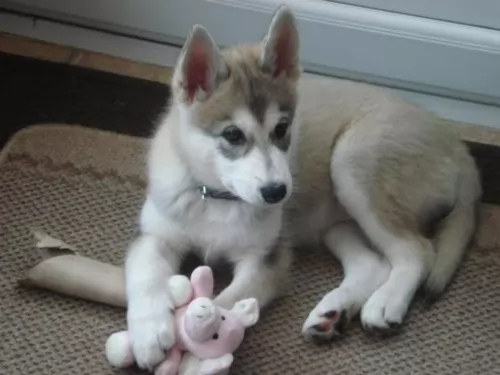 These dogs are large and lean, looking vibrant and strong. They stand at between 63-84 cm in height and weigh roughly between 32-40 kg.
These dogs are large and lean, looking vibrant and strong. They stand at between 63-84 cm in height and weigh roughly between 32-40 kg.
The body is long with strong but slender legs with webbed paws. They look like wolves with the sharp muzzle, the erect ears, bushy tails and slanted eyes with black eye rims. The double coat is thick and straight. Colors of the coat can be silver or gey, cream, brown, or black. The coat becomes thicker in the Winter.
The Utonagan is a very social dog, wanting to spend a lot of time with his human family. They have so many excellent qualities that make him a splendid pet - loving, loyal and gentle.
Whether you have other pets in the home or children, he is a dog that is able to get on with everyone. He is wary of strangers though and with training ad socialization he is going to be the most fantastic pet and companion.
 Very good with children as long as he gets enough exercise.
Very good with children as long as he gets enough exercise.
Very athletic
A puppy could live in an apartment in the city, but the adult dog needs a yard and is better off on a farm.
Very smart, very responsive, high learning ability.
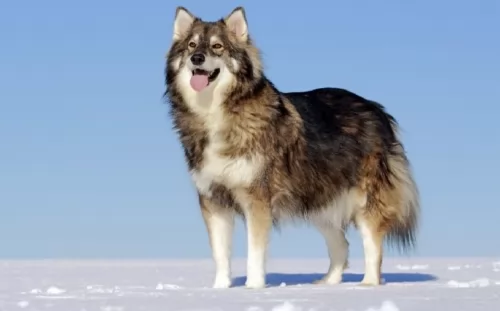 The Utonagan is an intelligent dog and also very social and people-oriented. He wants to be part of his human family, with a friendly, playful nature.
The Utonagan is an intelligent dog and also very social and people-oriented. He wants to be part of his human family, with a friendly, playful nature.
He will certainly not like being left alone and outside day after day. He can become frantic with frustration and this can be laid at the feet of an irresponsible dog owner.
Give him the life he wants and deserves, and this beautiful wolf-like dog will be your friend for life.
 Mostly healthy but the Hungarian Wirehaired Vizsla does have some inherited dispositions to:
Mostly healthy but the Hungarian Wirehaired Vizsla does have some inherited dispositions to:
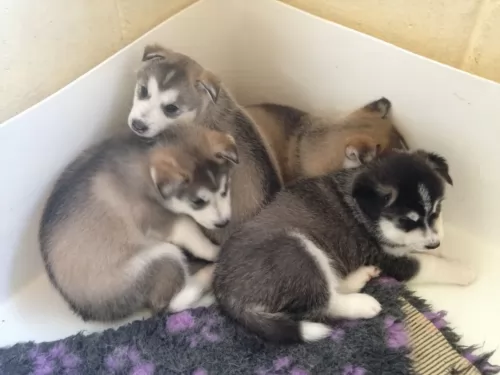 Yur Utonagans can live to be between 12 and 15 years of age, but a few issues can include cancer and joint dysplasia.
Yur Utonagans can live to be between 12 and 15 years of age, but a few issues can include cancer and joint dysplasia.
Cancer is a major cause of death in dogs old and young. There also seems to be some dog breeds that are more prone to cancer than others.
Thankfully most of the cancers are curable if you get them in the nick of time. The warning signs of cancer in your dog is much the same as with people and you’ll discover a new lump on your pet or a wound that simply won’t heal.
When you detect that your pet is lethargic and not acting his usual perky self, it is time to get him immediately to the vet.
 Feed high quality food for medium to large breed puppies. Feed 3-4 time a day 1-2 cups.
Feed high quality food for medium to large breed puppies. Feed 3-4 time a day 1-2 cups.
Feed high quality food for adult medium to large dogs. Feed 2x a day 2-3 cups.
Great stamina and very athletic breed.
The Wirehaired Vizsla is a working dog and needs serious daily exercise. He will be full of energy and excitement if he doesn’t get enough mental and physical stimulation. He needs a family that can walk a mole or two every day or jog with him. He easily becomes neurotic and high-strung if his energy is not dissipated. Excels at Field Trials, Competitive Obedience, tracking and Barn Hunt.
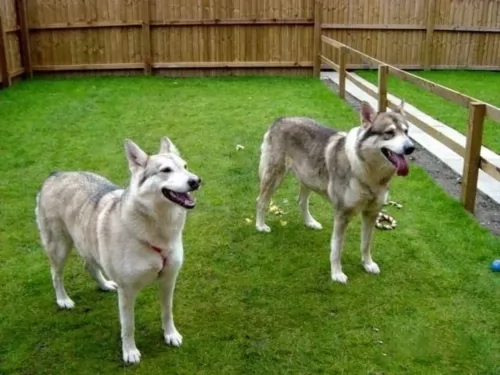 These are very high energy dogs and they will need exercise every day. While they will love a walk, they would be happier with something more vigorous such as a hike.
These are very high energy dogs and they will need exercise every day. While they will love a walk, they would be happier with something more vigorous such as a hike.
Swimming, ball games and hide and seek will all need to be on this dog’s menu of events. It is why it’s a dog that is better suited to life in the country as opposed to life in the city.
If you opt to buy this dog commercially manufactured food, he will need to have a high quality one high in vitamins and minerals and designed for energetic dogs. Try and avoid the inferior brands as they are packed with ingredients that can be of no value to your pet. There are ingredients which can actually make him sick.
Home-made food is always a good thing for dogs, especially when it is simple, nutritious food that won’t aggravate the stomach.
You can’t go wrong with foods such as boiled chicken, brown rice, and vegetables such as spinach, carrots and sweet potato. A little bit of raw meat added in occasionally can be excellent as well. Always make sure that a bowl of fresh water is available to your pet around the clock.
This is such a beautiful dog, you want to keep him that way. His thick coat is going to require regular brushing to keep it free from matting. Not only that, grooming stimulates the skin. You can also check him over at the same time for ticks and fleas and make sure there aren’t any unusual lumps on the body.
This type of dog values the grooming session as it is a bonding time for him, making him that much happier and content.
Other grooming needs will include taking care of his nails and checking inside his ears and mouth for signs of infection.